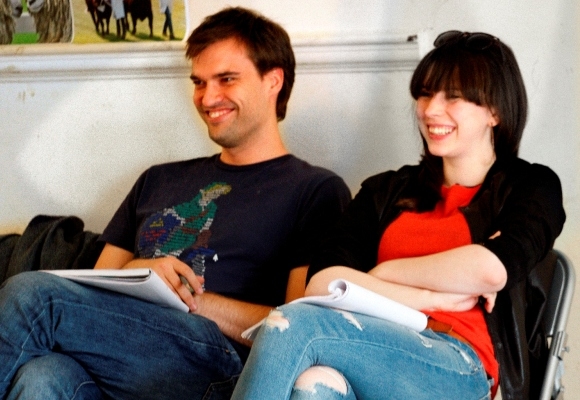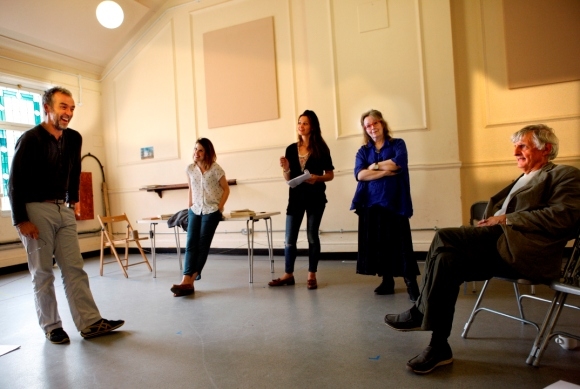Anya Reiss: 'We’re just trying to make it not a museum piece'
The playwright discusses updating Chekhov and her new version of ”Uncle Vanya” at the St James Theatre

© Simon Annand
"Once you take them out and get to play with them you get how great they are," she says, explaining that when she was forced to study them at school she "felt they were a bit on display". In partnership with director Russell Bolam, who first came to Reiss with the idea, she has brought each of these plays off the display shelf and into the modern day. The intention of this updating, however, is to illustrate Chekhov’s timelessness.
"The aim is trying to update it without it being about us being clever and introducing big ideas," Reiss stresses. "We’re just trying to make it not a museum piece."
The language of fidelity keeps recurring as Reiss talks about the adaptations. She refers to changing as little as possible, to making the transition to the modern day "seamless", and to "keeping true to the story". While Reiss admits that "obviously we’re trying to illuminate some aspects of it by making it modern," she is keen to emphasise that Uncle Vanya is "not a tongue in cheek modern day adaptation, its meant to be as faithful as it can be".
"There’s something about how he as a writer makes no judgement on any of the characters"
So why update these plays in particular? "I think they were just very ahead of their time, so they do work now," Reiss suggests. "I think there’s something about how he as a writer makes no judgement on any of the characters. It means that they feel more timeless than if he’d put a moral spin on them." She adds that Chekhov "wrote a modern play about people and we’re just trying to show that it’s still the same thing".
In the process of updating, Reiss and Bolam come at the plays from very different directions. While Bolam is "the big Chekhov nut" who buries himself in research, Reiss aims to focus purely on the text itself. "I deliberately maintain my no research approach, so I just take the text as I see it, and he takes it with this knowledge of the history behind it," Reiss explains. "If we’re both opposite ends of the seesaw, we get to a good equilibrium."
The key choice to be made with each adaptation is the modern British equivalent of Chekhov’s Russian settings. The Seagull was relocated to the Isle of Man; in Three Sisters, the siblings of the title yearn for London rather than Moscow, while languishing in a British Embassy in the Middle East. In the case of Uncle Vanya, in which rural isolation again plays a vital role, Reiss has plumped for a farm in Lincolnshire. True to the original, she explains that her updating explores the divide between country and city, as well as highlighting the play’s implicit class divide – an issue that feels even more pertinent in the affluent surroundings of the St James Theatre.

© Simon Annand
The other theme that Reiss has been careful to preserve is that of the wasted life. "In the original there’s this sense that they go around going ‘I’ve wasted my life and it’s too late to start again,’ and now we’re in a context where it is slightly easier to start again," says Reiss. "I think it does bring out something about self-paralysis in people now and about how you let circumstances define you and don’t always fight against them. In the original it is the same thing. They could start again, it’s not impossible, it is the same thing of self-paralysis, but just putting it in a modern context makes it more noticeable."
Reiss compares this with her modern version of Three Sisters, to which many people asked "well, couldn’t they just hop on a plane home?" She insists, "it isn’t a play about how you literally cannot go home because that’s not a drama if it’s just about people where the circumstances don’t allow them to go home. They let themselves be paralysed, they let themselves not make the decision that they should make, and putting it in a modern context just shows it stronger."
Or, putting her approach more bluntly, "updating it feels like you’re eliminating all that bullshit that doesn’t matter". Discussing the importance of the characters’ psychology, Reiss explains that the process of adaptation is about "forefronting people’s decisions more than their circumstances".
However faithful it might attempt to be, Reiss and Bolam’s approach to adaptation has been divisive among critics and audiences alike. Reiss acknowledges these criticisms, but is relatively relaxed about her detractors. "We always knew that it was going to divide people," she shrugs, suggesting that with Chekhov "there’s no way to do it right, because people love it so much". What is more important, she says, is being confident in her own logic for updating the plays.
"We just have to accept that people are going to be pissed off and feel that we’ve butchered it, but we know that we’re not trying to do that."
Uncle Vanya is at the St James Theatre until 8 November.












